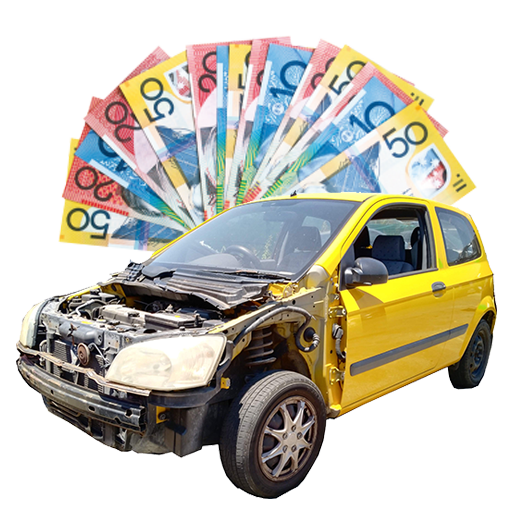Ever wondered how much cash you can actually get from an auto wrecker for your old car? It's a common question, and the answer isn't a simple one. The payout can swing from as little as $100 for a complete scrapper to well over $9,000 for a newer or sought-after model. There's no fixed price list; every offer is a custom valuation of your specific vehicle.
Your Quick Guide to Auto Wrecker Payouts
Selling to a wrecker isn't like a normal private sale. They're not looking at its ability to get you from A to B. Instead, they're assessing its hidden value—the sum of its parts and the worth of its raw materials.
An auto wrecker sees a treasure trove of potential inventory. They see an engine, a transmission, an alternator, doors, and a certain weight in recyclable metal. It's this dual perspective that causes the huge fluctuation in what they'll pay.
For example, a common sedan with a completely shot engine might only fetch its value in scrap metal. But a popular ute with some panel damage and low kilometres? That could be a goldmine for them because the demand for its parts is sky-high. Understanding what wreckers are looking for is the key.
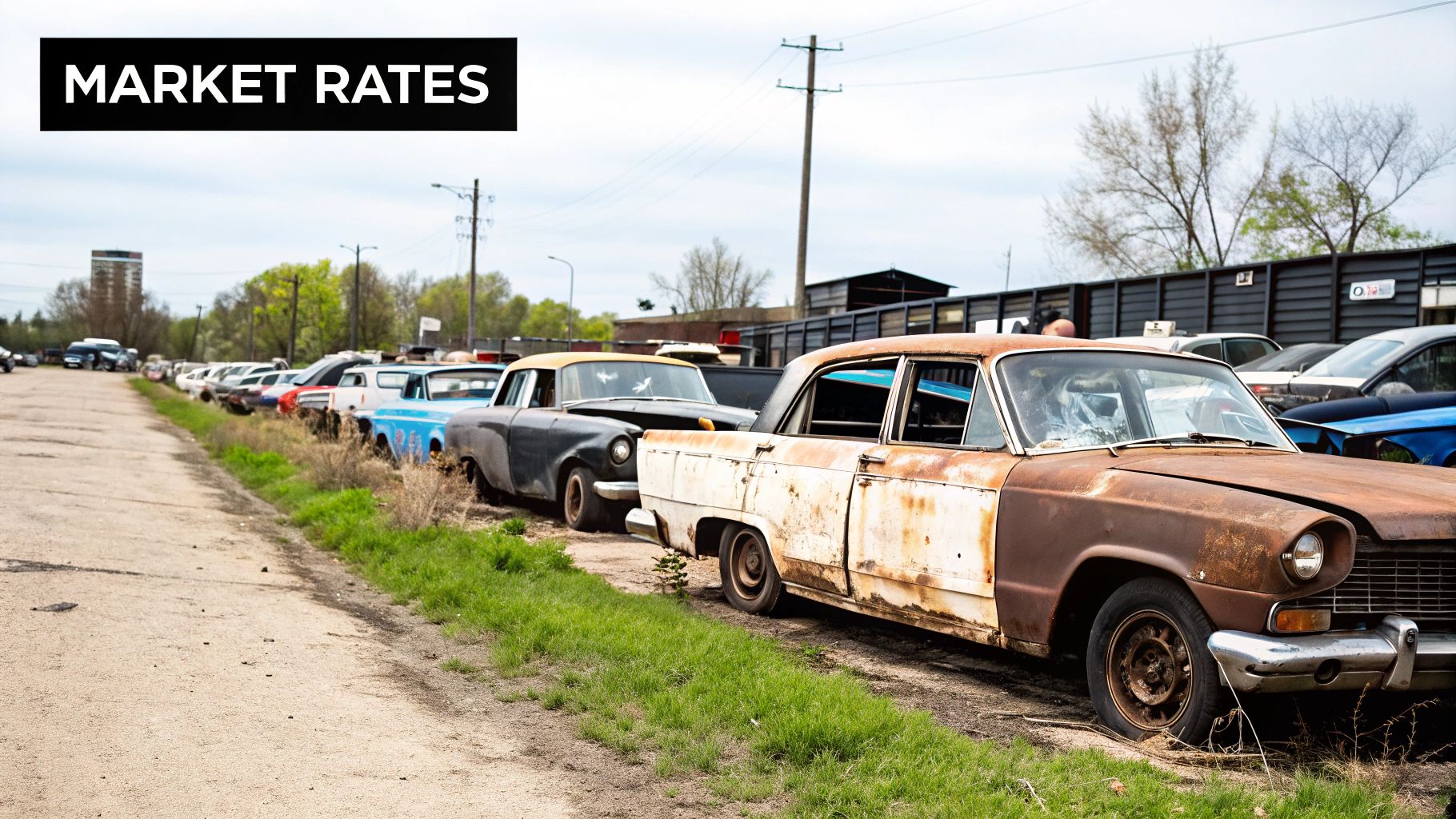
The biggest mistake people make is thinking their car is worthless just because it doesn't run. The truth is, a stationary vehicle packed with desirable components can fetch a surprisingly high price from the right wrecker.
To give you a realistic idea of what to expect, we need to unpack the main factors that go into their calculation. In Melbourne, for instance, actual payouts have ranged from $100 to $9,999. The average scrap removal tends to land somewhere between $750 and $1,200, which really highlights how much your car's specific details matter. You can get a deeper look into Melbourne's car wrecker pricing to see how these figures break down.
To make this simple, the table below summarises the critical factors that wreckers look at when they're putting together a cash offer for your car.
Key Factors Influencing Your Car's Wrecker Value
| Factor | Impact on Price | Example |
|---|---|---|
| Make, Model & Year | High | A 2015 Toyota Hilux has more valuable parts than a 2002 Ford Falcon. |
| Condition | High | A car with minor panel damage is worth more than one with severe rust or fire damage. |
| Usable Parts | Very High | A working engine, transmission, and alternator significantly boost the offer. |
| Kilometres | Medium | Lower KMs suggest less wear on parts, making them more desirable for resale. |
| Scrap Metal Weight | Base Value | The car's kerb weight determines its minimum scrap value, providing a price floor. |
| Location | Medium | Proximity to the wrecker's yard can affect the offer due to towing costs. |
Each of these elements plays a part in the final calculation, helping the auto wrecker turn your old car into a fair cash offer.
How Wreckers Actually Figure Out Your Car's Value
Ever wondered how a wrecker comes up with a cash offer for your old car? It's not just a random number they pull out of a hat. There's a method to the madness, blending a bit of treasure hunting with a straightforward calculation of raw materials.
Essentially, your car's value is split into two main streams: what can be salvaged and resold, and what's left over to be weighed as scrap metal.
First up, the wrecker puts on their treasure hunter's cap. They're scanning your vehicle for high-demand, reusable components. Think of the big-ticket items like engines, transmissions, catalytic converters, and even alternators as the 'jewels' of the car. If these parts are in decent, working order, they have immediate resale value, which can give your offer a serious boost.
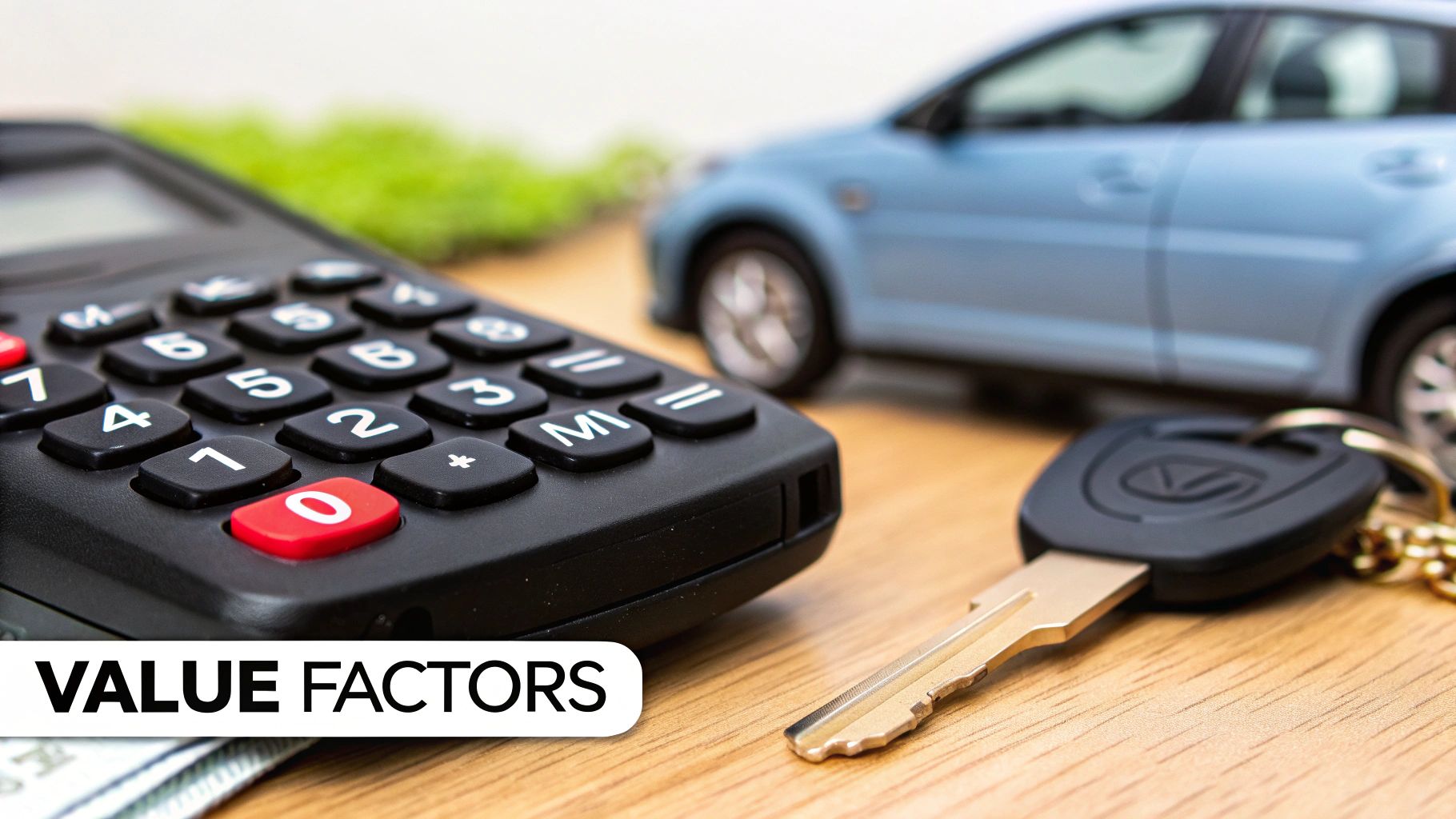
This is precisely why the make and model of your car are so critical. A popular model with parts that mechanics are always searching for is naturally going to be worth more than an obscure car with little demand. Understanding how much wreckers pay for cars often starts with knowing how popular its parts are on the second-hand market.
The Scrap Metal Equation
After all the valuable parts have been identified and accounted for, the second part of the valuation kicks in. The car's leftover body and frame—the shell—is valued based on its weight.
This is where your car's kerb weight comes into play, providing a baseline value that moves up and down with the daily market price of scrap metal. A bigger, heavier vehicle simply has more metal to recycle.
For instance, scrap steel prices can bounce around anywhere from $200 to $350 per tonne. Your car also contains other valuable metals like copper and aluminium, which are tallied up and added to the final scrap value.
A wrecker’s offer is a simple sum of two things: the market value of the reusable parts plus the current scrap value of the leftover metal.
So, even a car that’s completely written off has a guaranteed minimum value based purely on its weight in metal. The real key to getting a top-dollar offer, though, is having those functional, in-demand parts that can be salvaged, pushing your payout well beyond the basic scrap price.
Why Vehicle Condition Dictates Your Payout
When an auto wrecker looks at your car, they're not really seeing the faded paint or the coffee stain on the seat. They're looking past the surface to what really counts: the working parts inside. It’s a common misconception, but a car with a few dings and a running engine is almost always worth more to them than a polished, shiny vehicle with a dead motor.
Think of it this way: a running car is like a treasure chest that’s already proven to hold gold. The wrecker knows that the most valuable pieces—the engine, the transmission, the whole drivetrain—are likely in good nick. These are the components they can pull, clean up, and sell for a decent profit to mechanics or people working on their own cars.
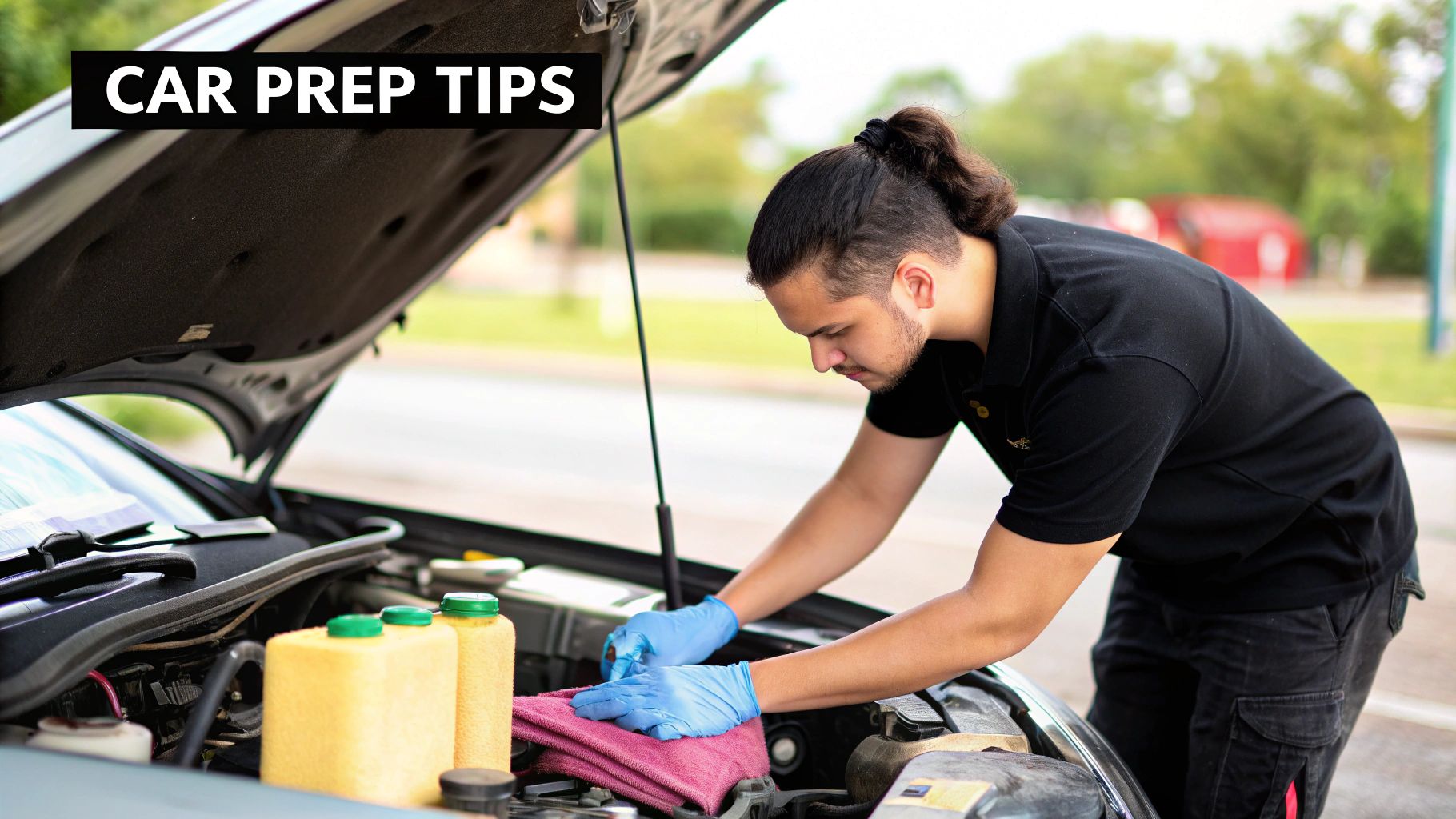
The final offer you get will lean heavily on how many of these parts are salvageable, and the engine's condition is usually the number one factor. Even if the car is undriveable, an engine that just turns over can add a surprising amount to your cash offer compared to one that’s completely seized up.
Running vs Non-Running: A Clear Value Difference
The gap in what you'll be offered for a car that starts versus one that doesn't can be huge. A non-runner is often just seen for its scrap metal weight, which means your payout will be at the absolute bottom of the scale. It's valued as a lump of steel, not a car.
On the other hand, a car that runs—even if it has other big problems—is sized up as a collection of valuable parts first and a pile of scrap metal second. That single difference can easily mean an extra few hundred dollars in your pocket.
So, what are they actually looking for? Here's a quick breakdown of their priorities:
- Mechanical Health: The big questions are always: Does the engine work? Does the gearbox shift properly? These are the make-or-break items.
- Major Part Integrity: Key components like the alternator, radiator, and especially the catalytic converter can fetch a good price if they’re still intact.
- Structural Damage: Cosmetic issues don't matter much. But serious rust or a bent frame is a different story, as it can make most parts worthless and drop your offer right back down to scrap value.
A car that can limp onto a tow truck under its own power is almost always worth more than one that needs to be dragged. The ability to start is the clearest sign of internal value.
At the end of the day, every single working part adds a little more to the total. The more components a wrecker can pull off and put on their shelves to sell, the higher your payout will be. It really does prove that what’s under the bonnet is what matters most.
Comparing Payouts Across Different Vehicle Types
It's no surprise that not all cars are created equal in the eyes of an auto wrecker. Think of it like this: a big, beefy SUV has more raw material and chunkier components than a zippy little hatchback. This fundamental difference in size and weight is the starting point for how wreckers figure out what your old car is worth.
A heavy-duty 4WD or a commercial van is packed with far more steel, aluminium, and copper than a small city car. That sheer mass alone gives it a higher base value as scrap metal. But it goes deeper than that. The parts inside—like powerful engines, sturdy transmissions, and larger catalytic converters—are often more sought-after and fetch a higher price on the resale market.
The condition of your vehicle also plays a huge role. A car that's seen better days might just be valued for its scrap metal, while one with plenty of good parts left can be worth a whole lot more.
This visual breakdown shows just how much condition can swing the final price.
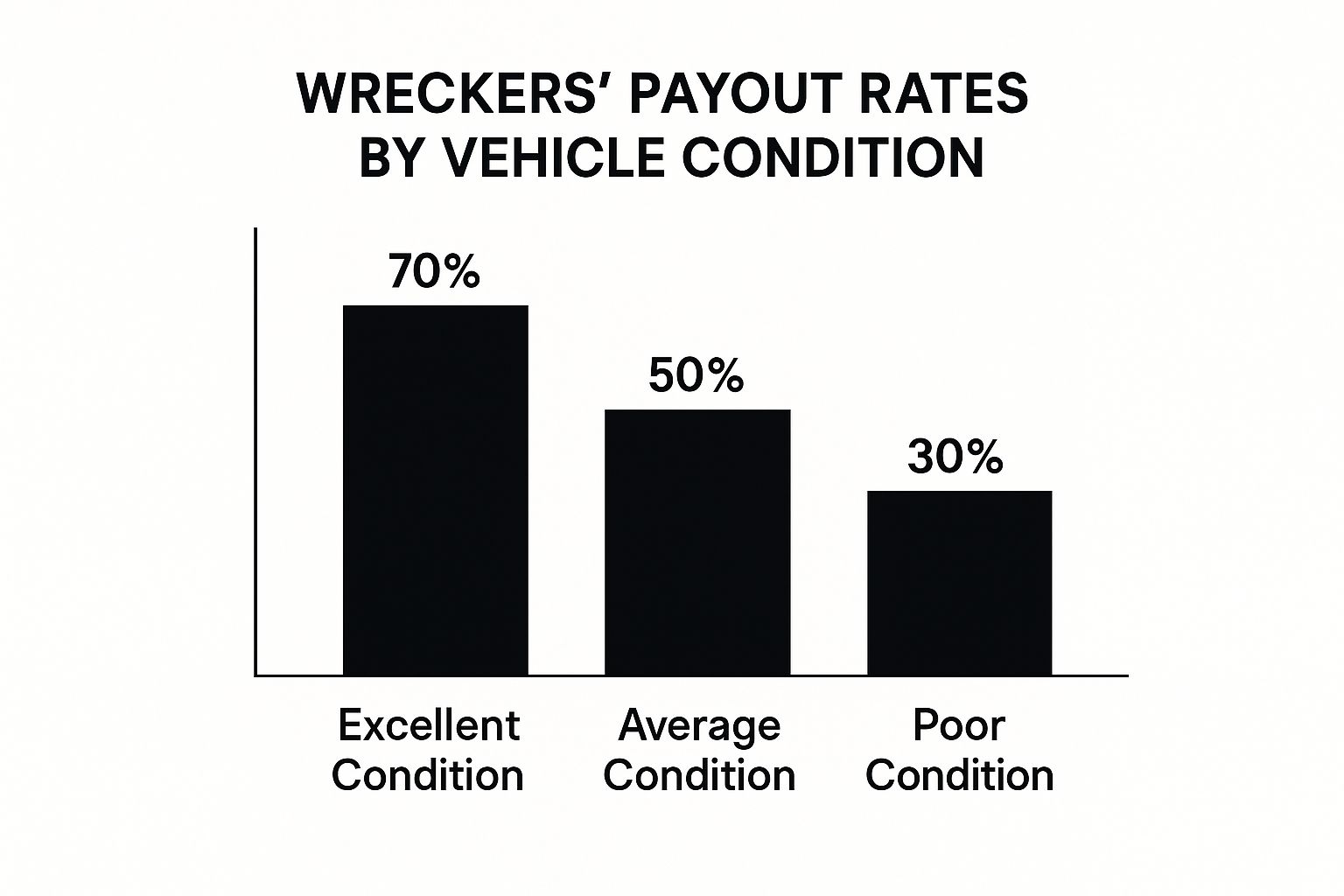
As you can see, a car in great nick with lots of usable parts can easily be worth more than double one that's only good for crushing.
Typical Payouts by Vehicle Category
To really get a feel for how this works, it helps to look at some real-world numbers. Your vehicle's type is one of the biggest clues to its potential payout. Here in Western Australia, for instance, the difference between a small sedan and a big truck is massive.
A small sedan might fetch you a couple of hundred dollars, while a retired commercial truck could be worth thousands. It all comes down to scale—more vehicle almost always means more cash.
The offers really start to vary when you break them down by category. A standard car could get you anywhere from $200 to $6,999, all depending on its state. Step up to a van, bus, or 4WD, and the range climbs to $250 up to $9,999. For the real heavyweights like trucks, payouts can start at $450 and go all the way up to a hefty $14,999. If you want a closer look at these figures, you can check out some detailed insights on payouts in WA.
Let's break down these typical ranges in a clearer way.
Estimated Wrecker Payouts by Vehicle Type
The table below gives you a general idea of what wreckers might offer for different kinds of vehicles, highlighting what makes each one valuable.
| Vehicle Type | Typical Payout Range (AU$) | Key Value Drivers |
|---|---|---|
| Sedans & Hatchbacks | $200 – $6,999 | Catalytic converter, engine/transmission (if running), scrap metal weight. |
| Vans & 4WDs | $250 – $9,999 | Larger engines, heavy-duty parts, differential, higher scrap weight. |
| Commercial Trucks | $450 – $14,999 | Diesel engines, gearboxes, axles, substantial scrap metal volume. |
Ultimately, these numbers show why it's so important to know what you've got. Understanding where your vehicle fits—whether it's a small runabout or a big workhorse—gives you a realistic starting point for negotiating a great price.
Actionable Steps to Maximise Your Cash Offer
Understanding how auto wreckers work out their price is one thing, but using that knowledge to get a better deal is where the real magic happens. With a little bit of preparation and a smart approach, you can genuinely increase the cash you walk away with. It’s all about creating a bit of competition and presenting your car in the best possible light.
The biggest mistake you can make is taking the very first offer you get. Always, always get quotes from at least a few different wreckers. This gives you a clear picture of what your car is worth on the market and provides fantastic leverage. When a wrecker knows you're shopping around, they're far more likely to put their best foot forward right away.
When you call for a quote, be prepared with an honest but strategic description of your vehicle.
Present Your Vehicle Effectively
You don't need to pretend your car is perfect, but you absolutely should highlight its strong points. Did you just put a new alternator in a few months ago? Are the tyres almost brand new? Mention it! These are valuable parts the wrecker can salvage and resell, and that adds direct value to your quote.
A few simple tips can make all the difference:
- Get Your Paperwork Together: Have your title (proof of ownership) and registration info on hand. Reputable businesses appreciate a smooth, legitimate transaction.
- Be Straightforward About the Condition: Let them know about major problems, like if the engine won't start or if there's significant rust. This builds trust and means the quote they give you over the phone is more likely to be accurate.
- Emphasise Recent Upgrades: Make a quick list of any parts that are still in great shape or were recently replaced. These are the assets they're most interested in.
Be very careful about choosing a licensed and reputable wrecker. Some less professional outfits will quote a high price to get you interested, only to slap you with hidden towing fees or other charges, cutting down your payout after you’ve already agreed to the deal.
Ultimately, a bit of organisation helps you secure a fair price without any frustrating last-minute deductions. For a more detailed walkthrough, you can learn more about how to get the best deal when selling your car for cash in Adelaide in our comprehensive guide. Taking these simple steps will put you in the driver's seat, ensuring you get the maximum cash your old car truly deserves.
Common Questions About Selling to Wreckers
Selling your car to a wrecker is pretty simple, but it’s completely normal to have a few questions before you dive in. Knowing what to expect makes the whole process feel much smoother, from that first phone call to the final handshake.
Let's walk through some of the most common things people ask.
Will I Be Charged for Towing?
This is probably the number one question we hear. And the answer is almost always no. Any reputable auto wrecker will offer free car removal as part of the deal, especially if your car is located within their main service area. It’s always a good idea to double-check this when you get your quote, just to make sure there are no hidden surprises.
What Paperwork Do I Need?
Another big one is about the necessary paperwork. To sell your car, you'll need two main things: proof of ownership (like the vehicle's registration papers or title) and a valid photo ID. This is just to confirm you're the legal owner and have the right to sell it.
Do I Need to Cancel My Registration and Insurance?
Yes, absolutely. Once the wrecker has driven off with your old car, a couple of final admin tasks are left for you. You’ll need to contact your local transport authority to cancel the vehicle's registration—you might even get a small refund for any unused portion.
At the same time, when you sell a vehicle, it's a good idea to review your auto insurance considerations and get in touch with your insurer. You'll need to cancel the policy or see if you can transfer it over to a new car.
The most important takeaway is to be prepared. Having your proof of ownership and ID ready will make the transaction quick and hassle-free, allowing the wrecker to pay you on the spot without any delays.
Do I Have to Be There for the Pickup?
In most situations, yes. You'll need to be present to sign the final transfer paperwork and, most importantly, to collect your payment. The driver will handle the essentials, but your signature is required to make the sale official.
If you want to explore the process in more detail, our complete guide on selling cars to wreckers provides an in-depth look at every single step.
Do you have an old, broken, or unwanted car taking up space? Auto Removal Adelaide offers top cash payouts and free car removal across the Adelaide area. Get your instant quote today!

